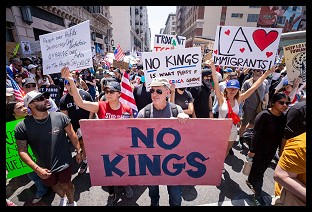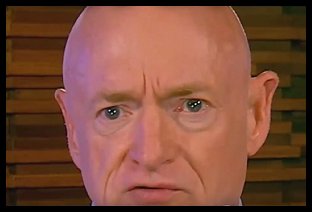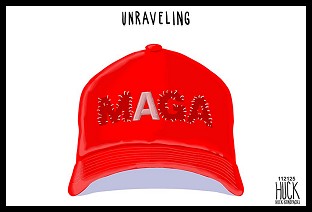Guest Editorial by Ernest A. Canning
 Newly introduced legislation would permit Wall Street wolves to drive off America's financial shepherds.
Newly introduced legislation would permit Wall Street wolves to drive off America's financial shepherds.
It is perhaps useful to think of the Wall Street executives who swindled their own investor/clients and nearly devoured the world's economy as predators.
One response to their predations has been exemplified by the Occupy Wall Street "move the money" campaign in which billions of dollars have been transferred from the "too big to fail" Wall Street banks to local banks and credit unions. Another response has come from former Wall Street broker/dealers, who, repulsed by a fraudulent system that created and sold toxic assets to unwitting investors even as their firms bet against the assets, opted instead to become independent Registered Investment Advisors (RIAs) who will only accept fees from their own investor/clients to whom they owe a fiduciary duty to disclose all potential conflicts of interest.
Introduced by Rep. Spencer Bachus (R-AL), the Chairman of the U.S. House Financial Services Committee and the number one fundraiser from commercial banks, finance/credit companies, and mortgage bankers and brokers during the 2011-2012 election cycle, the so-called "Investment Advisor Oversight Act" of 2012 (H.R. 4624) claims that it is meant "to amend the Investment Advisers Act of 1940 to provide for the registration and oversight of national investment adviser associations."
In reality, however, the bill represents nothing less than an effort by the Wall Street wolves to drive off these financial shepherds so that they may feast on a field of unprotected sheep (the consumers of financial products)...
Fraudulent Wall Street broker/dealer model
A fictional, yet powerful example of the conflict-of-interest and utter lack of fiduciary responsibility that exists on Wall Street can be found in the exchange between Sam Rogers (portrayed by Kevin Spacey) and his CEO, John Told (Jeremy Irons), in the movie Margin Call (see trailer here)...
TOLD: We are selling to willing buyers at the current fair market price so that we may survive.
The real world example was exposed during the April 16, 2010 exchange between Sen. Carl Levin (D-MI), Chairman of the U.S. Senate Internal Affairs Subcommittee on Investigations and Daniel Sparks, former Mortgages Department Head at Goldman Sachs (see video below), pertaining to the fact that Goldman sold hundreds of millions of dollars in securities without advising their investors that Sparks' own staff regarded the sale as a "shitty deal."
In typically Orwellian Wall Street doublespeak, Sparks sought to justify the appalling lack of fiduciary responsibility by suggesting that the price at which Goldman sold the securities "reflected levels that they [the duped investors] wanted to invest."
America's financial shepherds
The counterpoint to the absence of fiduciary responsibility on Wall Street can be found in the ethical standards adopted by the National Association of Personal Financial Advisors (NAPFA), which requires that advisors take a "Fiduciary Oath." The NAPFA standards preclude accepting fees or commissions from anyone other than their investor/clients (e.g., commissions from the sellers of financial products) and mandates "written disclosure...of any conflicts of interest, which...reasonably may compromise the impartiality or independence of the advisor."
While not all independent financial advisors belong to NAPFA, the absence of fiduciary responsibility appears to be a major factor that has driven many RIAs away from Wall Street's inherently corrupt broker/dealer model.
In an article that excoriated the Bachus bill, Neil C. Hokanson explains that he "left a traditional broker-dealer, Dean Witter Reynolds (now Morgan Stanley) for the same reason thousands of financial professionals and millions of investors have. The broker-dealer model...is rife with conflicts of interest and lack of clear disclosure of conflicts and fees faced by American consumers of financial advice."
Hokanson asserts that the following chart and a study by industry analyst, Cerulli Associates, illustrates how Wall Street is hemorrhaging both business and "'breakaway brokers' [who] uniformly cite the need for independence and objectivity as their primary reason for becoming independent."

Foxes in the hen house
Bachus' proposed new legislation, the Investment Adviser Oversight Act of 2012 (H.R. 4624), would transfer the right to regulate and oversee independent Registered Investment Advisors (RIAs) from the Securities and Exchange Commission (SEC) to the Financial Industry Regulatory Authority (FINRA), a non-governmental, self-regulating organization (SRO), with historical links to Bernie Madoff. FINRA is funded by the very Wall Street firms it is supposed to oversee.
FINRA describes itself as [emphasis added] "the largest independent regulator for all securities firms doing business in the United States."
In a May 29, 2012 letter, Angela Canterbury of the Project on Government Accountability (POGO), a non-partisan watchdog organization, suggests that "independent" is not a word that remotely applies to FINRA. To the contrary, she described the relationship between FINRA and the Wall Street firms it supposedly regulates as "incestuous." She cited a Government Accountability Office (GAO) report which observed that the very structure of self-regulation entails "inherent conflicts of interest because of the dual role of SROs as both market operators and regulators."
In the above-cited article, Hokanson adds that even the U.S. Chamber of Commerce acknowledges that FINRA lacks "the traditional checks and balances placed on governmental agencies." It is not subject to laws like the Freedom of Information Act which are designed to ensure transparency, or even by the Administrative Procedures Act. To this, Canterbury, in her May letter, adds, "FINRA’s board rejected a series of proposals approved by FINRA’s member firms that would have required the organization to provide transcripts of board meetings, employ an independent private sector inspector general to oversee the organization, and give FINRA members a non-binding 'say on pay' for the most highly compensated FINRA employees."
Canterbury referenced a disturbing case that underscored the lack of transparency in FINRA's opaque, privatized arbitration system:
But when Mensack and his attorney requested an audio copy of the arbitration hearing, they discovered that eight hours’ worth of testimony had mysteriously gone missing. Earlier this year, a FINRA regional director apologized...but informed Mensack and his attorney that "FINRA has no authority to reverse the award." Mensack has indicated that the missing recordings would have provided evidence of additional misconduct in the arbitration hearing. Several commentators have pointed to Mensack’s case as an example of "sham justice" before a "kangaroo court."
Rich Feight, a Certified Financial Planner (CFP) outlined the financial arrangements that underscore the fact that public regulatory bodies and the opaque FINRA have nothing in common:
Where it is unimaginable that a government agency would spend that type of money to lobby other governmental bodies, another fact reported by Feight suggests that FINRA used an alternative means to protect itself and the interests of its Wall Street financial titan members. FINRA handed Obama appointee, Mary Schapiro, a $9 million dollar golden parachute (bonus) that cushioned her Jan. 27, 2009 descent from her $3.2 million/year private position as FINRA's CEO to her $163,000/year public employment as chairperson of the SEC.
According to Ron Rhoades, the chairman-elect of NAPFA, "the largest and most powerful FINRA members worked in the late 1990s to ensure that the over-the-counter derivatives market would be kept out of the purview of government agencies." More recently, Rhoades adds, FINRA lobbied Congress to expand its powers "under the pretense that such an expansion would have prevented Bernie Madoff's massive Ponzi scheme" even though "many industry observers noted that it was FINRA's own failures as a regulator which enabled Madoff's Ponzi scheme to grow to such massive proportions."
Hokanson notes that, ironically, FINRA's board rejected an August 2010 member "resolution calling for an independent investigation of FINRA's directors' and officers' potential ties to Bernie Madoff," adding that Peter Madoff, Bernie's brother, "was a vice chairman of FINRA's predecessor, the NASD [National Association of Securities Dealers]."
Canterbury outlined additional aspects of the incestuous relationship, identifying, amongst others, a link between a former NASD director and convicted Ponzi schemer R. Allen Standford, and a former head of FINRA enforcement who "went on to represent JPMorgan in its widely criticized settlement with the SEC for allegedly structuring and marketing a complex mortgage securities deal just as the housing market was starting to plummet, without informing investors that the hedge fund Magnetar had essentially created the deal and bet against it."
Oversight as cover for unfair competition
FINRA spokesperson Nancy Condon lashed out at POGO's critique, claiming that the non-partisan, government watchdog organization had ignored an SEC study which reveals "the commission is unable to adequately oversee and examine the more than 11,000 independent advisors across the country."
But neither POGO nor any of the RIA articles cited above offer so much as a hint of resistance to added governmental oversight. Instead, for example, in her May 29 letter, POGO's Canterbury observed:
The real issue is why, when meaningful reform would entail eliminating the inherent conflict of interest in the Wall Street broker/dealer model and eliminating this utterly corrupt concept of "self-regulation," any objective observer would even dream of placing ethical investment advisors under the aegis of the Wall Street funded and compromised FINRA?
The answer, as suggested by Feight's article is to be found in the above-mentioned Boston Consulting Group evaluation which estimates that the move from SEC oversight to FINRA oversight will add a $57,700 per independent advisor expense to the cost of doing business --- "more than twice as much as it would cost to develop enhanced oversight by the [SEC]."
Simple economics reveals that this increased cost alone could serve to reduce the ability of RIAs to compete with Wall Street as small independent advisor firms may be forced to pass the increased cost onto their investor/clients.
Worse, as revealed by the Mensack v. Morgan Stanley FINRA arbitration, the incestuous relationship between FINRA and Wall Street could place RIAs at the mercy of an opaque arbitration system with no right of appeal. In disputes with their Wall Street competitors, RIAs would be foolish to assume they could receive anything remotely resembling objective and fair "legal" decisions.
Reform?
Real reform would entail an elimination of the conflict-of-interest that is inherent in the investor-client/Wall Street broker-dealer relationship.
While this author never practiced finance law, he has, over the years, represented a good number of severely injured employees. If an attorney persuaded an injured employee/client to settle at less than full value of his or her case after receiving a commission on the settlement from the employer or its insurance carrier, the attorney would be disbarred. In fact, simply entering the side agreement with the employer or insurance carrier would be grounds for disbarment.
Why shouldn't broker/dealers be held to the same fiduciary standards that apply to attorneys?
H.R. 4624 is the antithesis of "reform." It should not only be summarily rejected, but Congress should give serious consideration both to eliminating the Wall Street broker/dealer model and to adopting the recommendation made by NAPFA's Ron Rhoades' that FINRA be "disbanded."
Those interested in signing POGO's petition opposing H.R. 4624 can do so here.
FULL DISCLOSURE: While the author has no direct connection to the financial services industry, the author's son, who recently passed the taxing CFP exam, is employed by an independent Registered Investment Advisor firm, which provides Investment Management on a Fee-Only™ basis.
Video of 4/16/12 exchange between Sen. Carl Levin (D-MI) and Daniel Sparks, former Mortgages Department Head at Goldman Sachs, follows...
Ernest A. Canning has been an active member of the California state bar since 1977. Mr. Canning has received both undergraduate and graduate degrees in political science as well as a juris doctor. He is also a Vietnam vet (4th Infantry, Central Highlands 1968). Follow him on Twitter: @Cann4ing.


 With Thanks, No Kings and Good Cheer
With Thanks, No Kings and Good Cheer Presidential Illegality and the Duty to Disobey
Presidential Illegality and the Duty to Disobey Sunday 'Leave 'em in Stitches' Toons
Sunday 'Leave 'em in Stitches' Toons President of United States Calls for Killing Democratic Officials: 'BradCast' 11/20/25
President of United States Calls for Killing Democratic Officials: 'BradCast' 11/20/25 'Green News Report' 11/20/25
'Green News Report' 11/20/25 Is MAGA Finally Beginning to Fall Apart?: 'BradCast' 11/19/25
Is MAGA Finally Beginning to Fall Apart?: 'BradCast' 11/19/25 Trump's Terrible, Horrible, No Good, Very Bad Day (Week? Month? Year? Life?): 'BradCast' 11/18/25
Trump's Terrible, Horrible, No Good, Very Bad Day (Week? Month? Year? Life?): 'BradCast' 11/18/25 'Green News Report' 11/18/25
'Green News Report' 11/18/25 A Kaleidoscope of Trump Corruption: 'BradCast' 11/17/25
A Kaleidoscope of Trump Corruption: 'BradCast' 11/17/25 Sunday 'Back to Business' Toons
Sunday 'Back to Business' Toons Trump DOJ Takes Stand for Voting Whites in CA: 'BradCast' 11/13/25
Trump DOJ Takes Stand for Voting Whites in CA: 'BradCast' 11/13/25 'Green News Report' 11/13/25
'Green News Report' 11/13/25 Mamdani's 'Surprisingly Affordable' Afford-ability Agenda for NYC: 'BradCast' 11/12
Mamdani's 'Surprisingly Affordable' Afford-ability Agenda for NYC: 'BradCast' 11/12 After the Shutdown and Before the Next One: 'BradCast' 11/11/25
After the Shutdown and Before the Next One: 'BradCast' 11/11/25 2025 Election Victories; Also: 7 Dems, 1 Indie End Shutdown: 'BradCast' 11/10/25
2025 Election Victories; Also: 7 Dems, 1 Indie End Shutdown: 'BradCast' 11/10/25 'We Can See Light at the End of the Tunnel' After Election 2025: 'BradCast' 11/6/25
'We Can See Light at the End of the Tunnel' After Election 2025: 'BradCast' 11/6/25 BLUE WAVE! Dems Win Everything Everywhere All at Once: 'BradCast' 11/5/25
BLUE WAVE! Dems Win Everything Everywhere All at Once: 'BradCast' 11/5/25 Repub Thuggery As Americans Vote: 'BradCast' 11/4/25
Repub Thuggery As Americans Vote: 'BradCast' 11/4/25 Last Call(s) Before Election Day 2025: 'BradCast' 11/3/25
Last Call(s) Before Election Day 2025: 'BradCast' 11/3/25 A Pretty Weak 'Strongman': 'BradCast' 10/30/25
A Pretty Weak 'Strongman': 'BradCast' 10/30/25
 VA GOP VOTER REG FRAUDSTER OFF HOOK
VA GOP VOTER REG FRAUDSTER OFF HOOK Criminal GOP Voter Registration Fraud Probe Expanding in VA
Criminal GOP Voter Registration Fraud Probe Expanding in VA DOJ PROBE SOUGHT AFTER VA ARREST
DOJ PROBE SOUGHT AFTER VA ARREST Arrest in VA: GOP Voter Reg Scandal Widens
Arrest in VA: GOP Voter Reg Scandal Widens ALL TOGETHER: ROVE, SPROUL, KOCHS, RNC
ALL TOGETHER: ROVE, SPROUL, KOCHS, RNC LATimes: RNC's 'Fired' Sproul Working for Repubs in 'as Many as 30 States'
LATimes: RNC's 'Fired' Sproul Working for Repubs in 'as Many as 30 States' 'Fired' Sproul Group 'Cloned', Still Working for Republicans in At Least 10 States
'Fired' Sproul Group 'Cloned', Still Working for Republicans in At Least 10 States FINALLY: FOX ON GOP REG FRAUD SCANDAL
FINALLY: FOX ON GOP REG FRAUD SCANDAL COLORADO FOLLOWS FLORIDA WITH GOP CRIMINAL INVESTIGATION
COLORADO FOLLOWS FLORIDA WITH GOP CRIMINAL INVESTIGATION CRIMINAL PROBE LAUNCHED INTO GOP VOTER REGISTRATION FRAUD SCANDAL IN FL
CRIMINAL PROBE LAUNCHED INTO GOP VOTER REGISTRATION FRAUD SCANDAL IN FL Brad Breaks PA Photo ID & GOP Registration Fraud Scandal News on Hartmann TV
Brad Breaks PA Photo ID & GOP Registration Fraud Scandal News on Hartmann TV  CAUGHT ON TAPE: COORDINATED NATIONWIDE GOP VOTER REG SCAM
CAUGHT ON TAPE: COORDINATED NATIONWIDE GOP VOTER REG SCAM CRIMINAL ELECTION FRAUD COMPLAINT FILED AGAINST GOP 'FRAUD' FIRM
CRIMINAL ELECTION FRAUD COMPLAINT FILED AGAINST GOP 'FRAUD' FIRM RICK SCOTT GETS ROLLED IN GOP REGISTRATION FRAUD SCANDAL
RICK SCOTT GETS ROLLED IN GOP REGISTRATION FRAUD SCANDAL VIDEO: Brad Breaks GOP Reg Fraud Scandal on Hartmann TV
VIDEO: Brad Breaks GOP Reg Fraud Scandal on Hartmann TV RNC FIRES NATIONAL VOTER REGISTRATION FIRM FOR FRAUD
RNC FIRES NATIONAL VOTER REGISTRATION FIRM FOR FRAUD EXCLUSIVE: Intvw w/ FL Official Who First Discovered GOP Reg Fraud
EXCLUSIVE: Intvw w/ FL Official Who First Discovered GOP Reg Fraud GOP REGISTRATION FRAUD FOUND IN FL
GOP REGISTRATION FRAUD FOUND IN FL

































